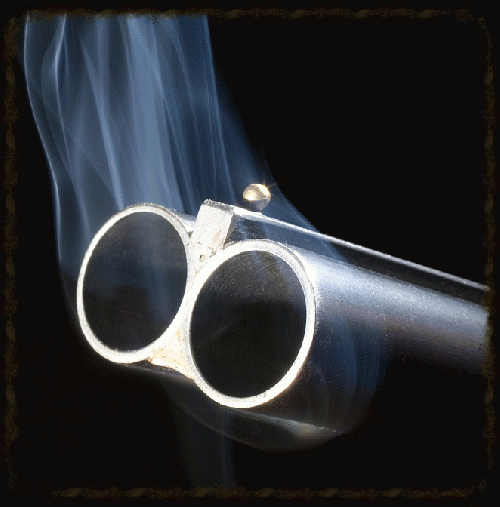We all agree about the need to keep guns out of the
hands of the mentally ill. Perhaps we also need to look at some psychological
issues influencing staunch defenders of gun rights. Many of these individuals
are not paragons of mental health because two of their unrecognized emotional
issues are triggering a double-barreled blast of self-defeat.
Before looking down these barrels, let us acknowledge
our human temptation to become enthralled by objects such as guns. We love our
playthings such as cars and boats. Collectors fancy guns, coins, stamps,
antiques, model trains, and so on. This interest or fascination can be harmless
enough and a source of considerable enjoyment. Yet psychological development is
impeded when we use a possession such as a luxury car or expensive painting to
provide status or fill an inner emptiness. Our enthusiasm for possessions can
rise to the level of a fixation or obsession, at which point our lack of
self-development causes us to lose perspective and sell short the richness of
our essential self.
Because guns are relatively inexpensive, they're not
usually purchased for status. Instead, they provide two psychological defenses--the
double barrels of self-defeat--that make their ownership so desirable. One
barrel discharges the illusion of safety and the other the illusion of power.
Why do so many gun owners grasp at these illusions or inner defenses?
Some Americans have a passion for handguns and assault
weapons because these firearms compensate for inner fear. We generate this fear
from within our psyche, based on unresolved inner conflicts. A lot of fear is
produced, for instance, through our unconscious defensiveness vis-a-vis our
inner critic. A lot of irrational fear is also left over from childhood. But
people tend to believe their fear is reality-based, meaning that, in their
minds, menace and genuine dangers do indeed lurk outside their door. They take
the uncertainty of life and translate it emotionally into a parade of red
flags.
Such gun enthusiasts are unconsciously determined to
validate their inner fears. Rather than resolve the inner conflict that
produces their fears, they make them seem legitimate by emphasizing emotionally
the dangers and menace that might exist in their towns, neighborhoods, and
workplaces.
Of course, some neighborhoods in America are dangerous
places. It is possible that some people are safer carrying guns. My point is
that unrecognized emotional issues make it more likely that people will be
fearful and irrational in ways that are self-defeating. We know that having a
gun does not guarantee survival and that expanding gun ownership, to the point
where more and more people are packing heat, is socially and morally
regressive.
We're often reluctant to let go of inner fears because
they're such a big part of our sense of self. We won't recognize ourselves
without them. We haven't yet achieved the level of inner freedom that produces
fearlessness. The more we try to justify our fears by "seeing" external
dangers, the further we slip into the irrationality and self-defeat that make a
gun feel like a necessary instrument of safety.
Many gun advocates rally around the Second Amendment
that protects the right to keep and bear arms, thereby affording protection
against home intruders, foreign invasion, and usurpation by rulers. Home
"intruders" are often family members or relatives shot by mistake in panic. A
foreign "invasion" of undocumented immigrants has already occurred, and guns
had no place in that occurrence. In the face of government tyranny, guns would
likely be self-defeating. Our intelligence and freedom of expression are much
stronger weapons. On the domestic front, the heroes of democracy fight with
their wits and their tongue (or typing fingers).
Weak people, however, do not necessarily feel or
practice the power of intelligence. They are too deeply enmeshed in impressions
of being menaced and overwhelmed by malice or evil to be fully rational. These
excessively passive impressions cause them to interpret their safety through
the extremes of brute force.
Let's look down the second barrel of the gun craze,
which is the illusion of power that guns conjure up. When we're inwardly weak,
meaning filled with self-doubt and inner conflict, we're often desperate to
produce an appearance or impression of aggression or power. A man who beats his
wife or children is desperate to feel power to cover up or deny his profound
inner weakness, namely his abandonment of all that is good and worthy in
himself. A woman who constantly berates her husband feels some second-rate
sense of power, but underneath she may feel trapped in her relationship and
blame her husband when she herself is entangled in a helpless sense of not
being able to improve her circumstances. A person failing in life due to
neurotic resignation or incompetence can feel that his or her angry complaints
and claims of injustice are expressions of strength or aggression. The weaker a
person, the more likely he or she can believe in guns as true expressions of
power and instruments of justice. Many individuals cling to that illusion to
protect their self-image and to avoid recognizing the extent of their neurosis.
Guns don't represent true power. If America were taken
over by an immoral force--a financial elite, for instance, that bought off and
corrupted our politicians--gun enthusiasts would be standing around casually,
blithely ignorant of non-violent dangers, fondling their weapons only for the
defense of their self-image.
This nation's preoccupation with guns is not so much
fear-based as passivity-based. We don't connect well enough with our better
self and the higher values of integrity, courage, wisdom, and compassion. On an
inner level, many people allow their inner critic to be the master of their
personality and to pass judgment on their worthiness. Inwardly, they're
emotionally weak and defensive, familiar with feeling helpless and overwhelmed,
yet desperate to exhibit some pretense of assurance and power.





